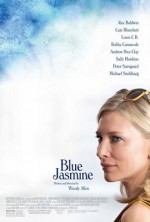‘Blue Jasmine’ offers witty, acerbic portrayal of reality, past and present

In Jack Kerouac’s “On the Road,” Sal Paradise proclaims he has “nothing to offer anybody except (his) own confusion.”
The same can be said about Jasmine French in Woody Allen’s funny and acerbic new film, “Blue Jasmine.”
In a dynamic and gut wrenching performance, Cate Blanchett plays Jasmine, a wealthy New Yorker whose marriage, and the luxurious life she has known, is taken away by a domino effect of shoddy business transactions from her polo-wearing, dyed hair husband Hal played with extra sleaze by Alec Baldwin.
Allen throws viewers into the present, and vacillates from present to past to the decisions and events that lead Jasmine to take shelter out west in San Francisco – which never look better, courtesy of cinematographer Javier Aguirresarobe – with her sister Ginger, an inhibited single mother of two played by Sally Hawkins who now has to put her future plans on hold with her boyfriend Chili, played by a spirited and intense Bobby Cannavale.
From “Annie Hall” to “Hannah and Her Sisters,” and with now with “Blue Jasmine,” Allen seems to comprehend the inner discourse of a woman and her plights.
Jasmine falls right in line with Allen’s strong, but mercurial, female characters, but also resembles Blanche DuBois, the female protagonist in Tennessee Williams’ “A Streetcar Named Desire,” a role Blanchett played on Broadway in 2009.
Jasmine’s constant conjuring up the past reminds us of the life she back east, filled with lavish dinner parties and yacht adventures to the Mediterranean. But underneath the glamour was a life rooted in shady business schemes, and infidelities from her husband. She lost everything, and simultaneously her mind in the process. There is not enough Xanax and Stoli Martinis in San Francisco to numb her from the pain that she seems unwilling to recover from.
Jasmine is obstinate at first toward her transition from the lavish lifestyle she has known to an almost impecunious one, taking a job as a dental receptionist and pursuing computer classes at night in order to take interior decorating courses online. Jasmine is incapable of the hard work required of her, and falls back to old habits, seeking a man who can provide her with the lifestyle she is accustomed of living.
Blanchett inhabits Jasmine with such vitality and anguish.
Her eyes glazed over from booze and pills, you feel at any moment her misery is too much to overcome. Come award season, it is likely Blanchett will be thanking Allen, which so many female actors have done before.
The characters in the film have no problem conjuring up the painful memories of the past, such as Auggie, played by ’80s foul-mouthed comedian Andrew Dice Clay, unwilling to absolve Jasmine and Hal from bad investments they made for him and Ginger, which led to their divorce.
What makes the past so compelling is that the audience see both sides of Jasmine’s personality.
We see her as the affluent Park Avenue wife, a title that is like a full-time position along with her philanthropy work that exudes the generosity of the rich and powerful, and when the dominos start to fall, her hysteria is tortuous.
Allen does not dwell too much on it, giving us what we need to conclude the rest of the events that will soon be divulged in the present.
Jasmine is a deplorable woman, but somehow Blanchett makes us pity her current state of confusion. She makes us connect to her despair, and makes Allen’s latest film is most satisfying since “Midnight in Paris.”
Allen is one of only a handful of great American auteurs still making compelling films. It’s good to see Hollywood still gives him what he needs in order for us to experience one of the true originators in American cinema.
Grade: A-





